Yezin Agricultural University (YAU) was facing some issues with the quality of education and research, as well as the planning and management of the university. To support solving these issues, JICA teamed up with a network of universities in Japan working at the forefront of international cooperation in the field of agriculture. This collaboration has worked so well, YAU is now looking to expand good relationships with universities in other ASEAN countries.
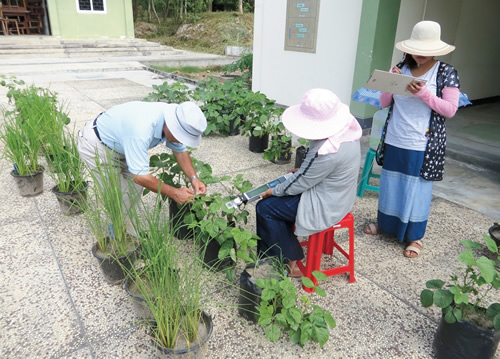
Researching the growth of rice and vegetables.
Rice is also grown at the university, and the growth status and other aspects are carefully measured.
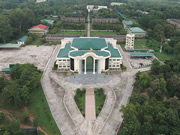
Yezin Agricultural University (YAU), Myanmar's only agricultural university.
YAU photographed from above using a drone.
Students and Academic Staff Take the Initiative
In Myanmar, about 70% of the population are engaged in agriculture. YAU is the only university-level higher education institution in Myanmar teaching agriculture, and produces a number of government officials agricultural technicians, extension officers, and researchers. However, as both a teaching institution and a research institution, YAU has not been able to invest sufficient funds in equipment and facilities, nor adequately enhance human resources development. To overcome this situation, YAU submitted a request for technical cooperation to JICA to help foster and strengthen human resource to an international level. In 2013, JICA supported construction of lecture and laboratory buildings, and the installment of laboratory equipment. On the completion of two buildings in 2015, a five-year technical cooperation project commenced, specifically targeting the enhancement of the university's capacity in the three fields of management, education, and research.
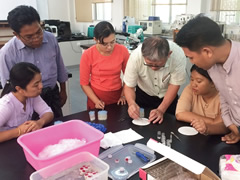
Students conducting experiments under the guidance of experts from Japan.
Mr. Tanaka Koji, Professor Emeritus of Kyoto University, was dispatched as the first Chief Advisor for the project and tasked with providing technical assistance on education and research. On arrival he encountered an outdated university system. "There was a top-down university management structure in place, a relic of the military administration. Education was based around a fixed curriculum focused on lectures, and it seemed as if students had no autonomy, and no researchers were being trained." So, along with YAU academic staff, Professor Tanaka started a survey of areas to improve in the university. In addition to the survey, the students and teachers were introduced to methods that would allow them to understand the issues more deeply and come up with ways to solve issues themselves. "With time the teachers changed their outlook. They came to understand the importance of pursuing research topics and the shape of the education they wanted to engage in," explains Professor Tanaka.
Today, YAU has a credit system and the students can select what they want to study. Research fields now boast 20 or 30 interdisciplinary teams, which carry out research on topics as diverse as improving rice varieties, crop management, and supply chain of farm products. They have also greatly increased the number of conference papers and articles published in international journals and presentations at international conferences.
Active Relations with Japanese University Networks
A number of experts have been dispatched to YAU from universities in Japan. This has been made possible by the Japan Intellectual Support Network in Agricultural Sciences (JISNAS). Professor Ogata Kazuo, one of the deputy vice-presidents of Kyushu University and chair of the JISNAS Steering Committee, has been involved with the YAU project since 2012. He expands upon the merits of the collaboration between JISNAS and the project.
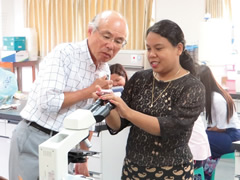
Instruction on biological microscope usage.
"A lot of universities in Japan carry out research in agriculture fields, and each of them has its own field of expertise. Therefore, before starting the project we asked within JISNAS about areas of potential cooperation and willingness to be involved in the project." This information allowed us to dispatch experts who had both the knowledge YAU wished to obtain and would willingly cooperate to improve Myanmar's agriculture.
Also, through a collaboration with JISNAS, increasing numbers of universities in Japan have been hosting YAU academic staff when they come to Japan to study. Japanese universities also derive benefits in contributing to the agricultural development in Myanmar, which has high potential for agricultural growth. There is also an expectation that international scholars will create ripple effects, helping support Japanese agriculture and the food industry.
In addition, JICA facilitates the invitation of experts from various ASEAN nations and the academic exchange programs to cooperate with universities in Thailand and Vietnam that are participating in JICA technical cooperation projects. There are also ideas for joint seminars and symposia, which will further strengthen collaboration with ASEAN nations.
The project is ready to enter its second stage. "In Myanmar, primary and secondary educational reforms are currently being legislated, after which, the next step is tertiary education reform," Professor Ogata says. "I think we need to make sure the next stage of cooperation matches the needs of the time, such as promoting research that leads to achieving the SDGs, in order to give meaning to cooperation. COVID-19 is drastically changing how universities operate, and both Japan and Myanmar are being forced to make changes and to utilize technology. I hope that we can continue to share our experiences while maintaining our exchanges."
Dr. Seint San Aye,
Professor, Yezin Agricultural University
Thanks to this project, it is now possible to carry out classes and research in a setting where the necessary equipment is available. This is a very significant outcome. We are now able to gain knowledge from a global perspective as well as from a Myanmar perspective. Our goal is to become a university that meets international standards, a place where research to solve Myanmar's agricultural problems can be carried out. I hope that we can continue this cooperative relationship with Japan.
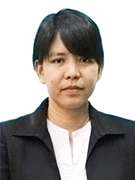
Let's cooperate internationally!
Japan Intellectual Support Network in Agricultural Sciences
JISNAS is a network of agricultural universities established to utilize the resources of Japanese universities in the field of international cooperation, including human resources and research. As of September 2019, it had 53 university members and 120 individual members. JISNAS itself is learning much from the YAU project. In addition to all member universities working together to provide assistance, JISNAS also hosts JICA's African Rice Promotion training as well as accepting international students from Afghanistan, Myanmar and other countries.




scroll